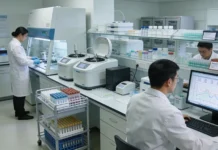In recent years, dietary supplements have become a major part of many people’s daily routines. From multivitamins and protein powders to herbal extracts and minerals, supplements are used to support health, fill nutritional gaps, and enhance overall wellbeing. However, not all supplements are created equal. One of the most important distinctions to understand is between pharma grade and food grade supplements.
While both categories may look similar on the surface, their differences in purity, quality control, and manufacturing standards can significantly impact their effectiveness and safety. Understanding these differences can help consumers make informed decisions about what they put into their bodies.
What Are Pharma Grade Supplements?
Pharma grade (or pharmaceutical grade) supplements are products manufactured to the same rigorous standards required for prescription medications. They must meet specific purity, potency, and quality requirements set by regulatory authorities such as the British Pharmacopoeia (BP), United States Pharmacopeia (USP), or European Pharmacopoeia (EP).
This means that pharma grade supplements contain the highest possible purity of active ingredients, typically 99% or greater, with minimal fillers, contaminants, or binders. Each batch is tested to ensure it meets precise specifications before being released for sale.
Pharma grade supplements are often produced in Good Manufacturing Practice (GMP)-certified facilities, where every step—from ingredient sourcing to packaging—is carefully monitored. These standards ensure consistency and safety, making these supplements suitable for medical use or professional healthcare settings.
For instance, a pharma grade vitamin C capsule must contain the exact amount of vitamin C stated on the label, with little to no deviation. It must also be free from harmful impurities such as heavy metals, bacteria, or chemical residues.
What Are Food Grade Supplements?
Food grade supplements, on the other hand, are produced to general food manufacturing standards, not pharmaceutical ones. These products are considered safe for consumption but are not required to meet the same strict testing or purity benchmarks as pharma grade products.
The purity level of food grade supplements can vary widely, typically containing between 80% and 95% of the labelled active ingredient. The remaining percentage may consist of fillers, additives, or impurities that occur naturally during manufacturing.
Food grade supplements are designed for general consumer use and are often more affordable than their pharmaceutical counterparts. However, because of less stringent oversight, there is a greater chance of variability in ingredient quality, potency, and absorption.
Key Differences Between Pharma Grade and Food Grade Supplements
The distinction between these two supplement grades lies primarily in quality control, purity, testing, and manufacturing oversight.
1. Purity and Potency
Pharma grade supplements are required to meet a purity level of 99% or higher, ensuring that almost all of the content is the intended active ingredient. Food grade supplements, however, are only required to meet minimum safety standards, and their active ingredient content can vary.
This difference in purity means that pharma grade supplements are more predictable and reliable in terms of dosage and efficacy. In contrast, food grade supplements may contain unwanted fillers or contaminants that can affect absorption or trigger mild reactions in sensitive individuals.
2. Manufacturing Standards
Pharma grade supplements are produced in facilities that follow GMP standards, ensuring that every stage of production adheres to strict hygiene, testing, and documentation requirements. These facilities are regularly inspected to ensure compliance.
Food grade supplements are manufactured in general food production facilities, where regulations are less strict. While these facilities must still ensure safety and cleanliness, the standards are not as rigorous as those applied to pharmaceutical-grade products.
3. Testing and Certification
Pharma grade supplements undergo comprehensive third-party testing for purity, strength, and bioavailability. Certificates of analysis (COAs) are typically available for each batch, verifying that the product meets its label claims.
Food grade supplements may undergo limited testing, and COAs are not always required. As a result, there can be inconsistencies between the labelled and actual content.
4. Bioavailability and Effectiveness
Because pharma grade supplements are formulated for optimal absorption, they tend to offer greater bioavailability—the degree to which nutrients are absorbed and utilised by the body.
In contrast, food grade supplements may use lower-quality ingredients or less effective delivery forms, leading to reduced absorption. This can make them less potent or slower to produce noticeable effects.
Safety and Regulation
Pharma grade supplements are closely aligned with medical standards and are often recommended by healthcare professionals. They are produced under regulatory frameworks that ensure traceability, documentation, and safety compliance.
Food grade supplements are regulated under general food laws, which focus primarily on safety for consumption rather than therapeutic efficacy. While they must not contain harmful substances, they are not required to demonstrate clinical effectiveness or pharmacological consistency.
This difference means that consumers should approach food grade supplements with greater caution, particularly if they are being used to manage specific health issues.
When to Choose Pharma Grade Supplements
Pharma grade supplements are ideal for individuals who:
-Require precise and consistent nutrient levels for medical or therapeutic purposes.
-Are recovering from illness or undergoing medical treatment.
-Have allergies or sensitivities to fillers, additives, or contaminants.
-Want guaranteed purity and potency in every dose.
-Are under the care of a doctor or nutritionist who monitors supplement intake.
For example, someone with iron deficiency anaemia might need a pharma grade iron supplement to ensure consistent dosage without gastrointestinal irritation caused by unnecessary additives.
Similarly, professional athletes and fitness enthusiasts often choose pharma grade protein powders and amino acids to ensure that they’re consuming exactly what their bodies need—without the risk of contamination or banned substances.
When Food Grade Supplements May Be Sufficient
Food grade supplements can still offer value, particularly for individuals who:
-Are generally healthy and looking to maintain overall wellness.
-Use supplements as a dietary top-up rather than a medical necessity.
-Have a limited budget but still want to support their nutritional intake.
For example, a person who eats a balanced diet but takes a daily multivitamin for reassurance might find a reputable food grade supplement perfectly adequate.
The key is to choose products from trusted manufacturers that follow quality assurance practices and provide transparent labelling about ingredients and dosages.
How to Identify Quality Supplements
Whether you opt for pharma or food grade supplements, knowing how to identify reputable products is essential.
Check for third-party testing – Reliable brands will have their products tested by independent laboratories and provide certificates verifying purity and potency.
Look for GMP certification – This indicates the manufacturer adheres to recognised quality standards.
Read labels carefully – Ensure the label lists all active ingredients, dosages, and any excipients (inactive ingredients).
Consult healthcare professionals – Seek advice from doctors, pharmacists, or nutritionists to ensure you’re selecting the right type of supplement for your needs.
These steps can help ensure that your supplements are both safe and effective, regardless of grade.
The Bottom Line
The difference between pharma grade and food grade supplements goes far beyond marketing claims—it reflects significant variations in quality, purity, and effectiveness.
Pharma grade supplements offer the highest standards of safety and consistency, making them ideal for individuals who need precise nutrient support or are managing specific health concerns. They come at a higher cost but deliver peace of mind and reliability.
Food grade supplements, meanwhile, remain a good choice for those seeking general nutritional support at an affordable price. They are widely available and convenient, but their purity and potency can vary.
Ultimately, the best choice depends on your individual health needs, goals, and budget. Whether you opt for pharma or food grade supplements, it’s essential to prioritise quality, verify sources, and consult professionals to ensure that what you’re taking truly benefits your health.



















